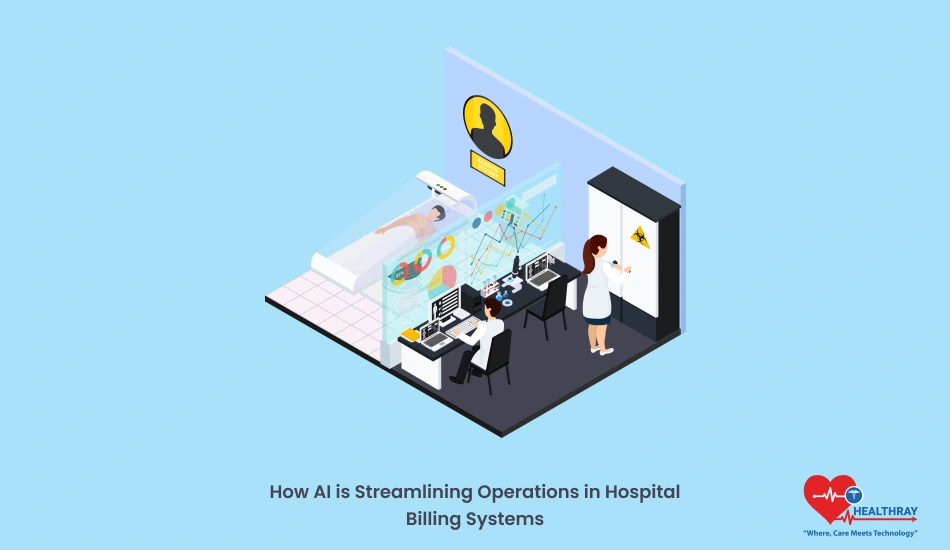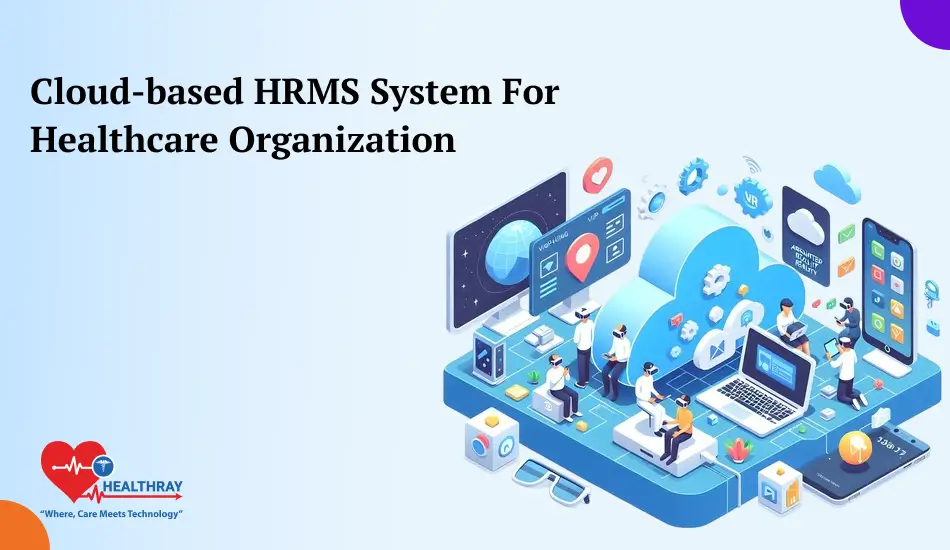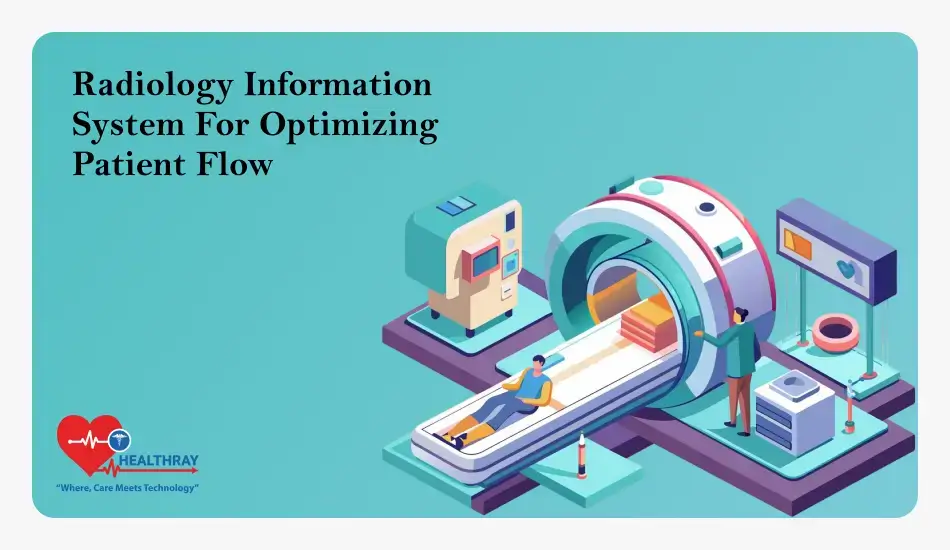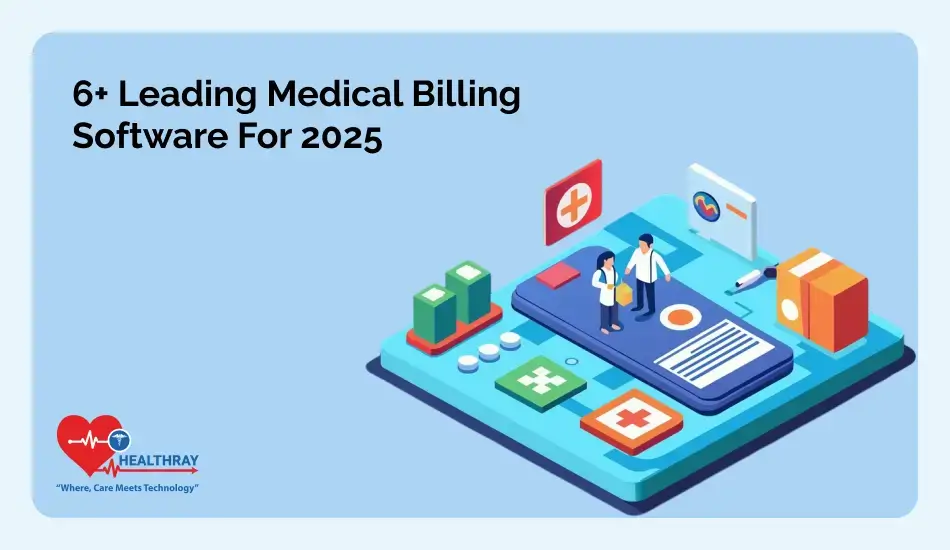Hospital billing systems are often weighed down by inefficiencies, errors, and ever-changing regulations. The sheer volume of data processing, combined with the need for precision, creates challenges that strain administrative resources. This is where AI steps in to offer a game-changing solution.
AI in hospital billing isn’t just about automation; it’s about transforming how billing systems operate. From faster coding to predicting claim denials, AI tools are revolutionizing these processes. They reduce human error, speed up billing cycles, and save costs—all while ensuring compliance with strict regulations.
In this article, we’ll explore how AI is streamlining Medical Billing Software. You’ll discover the key applications, benefits, and strategies for integrating AI, as well as the challenges you may face along the way.
The Current Challenges in Hospital Billing Systems
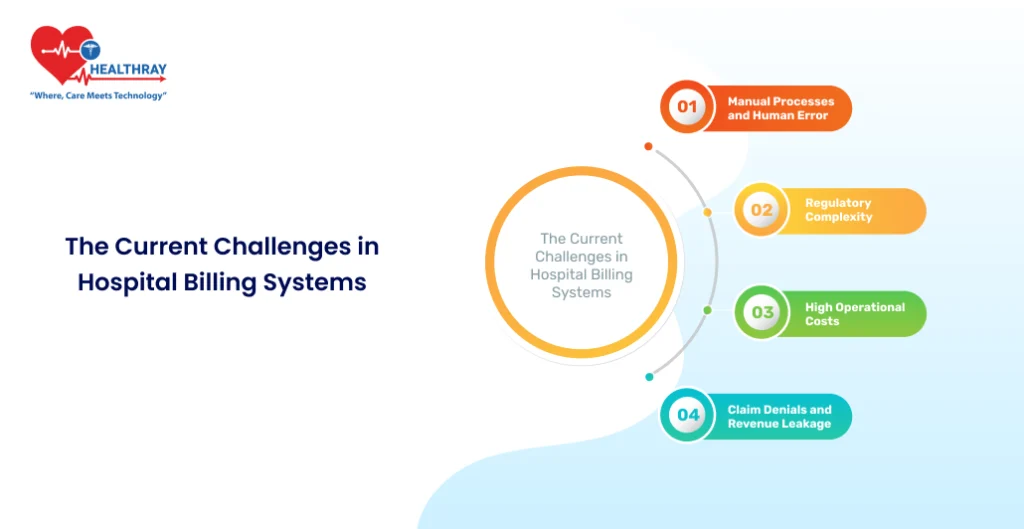
Hospital billing is one of the most complex administrative tasks in healthcare. The process often involves multiple steps, numerous stakeholders, and a need for absolute accuracy. Here are some of the biggest challenges faced by hospital billing systems:
Manual Processes and Human Error
Many hospitals still rely on manual entry for coding and billing, which leaves room for errors. A single misplaced digit or incorrect code can result in claim denials, delayed payments, or even compliance issues. Over time, these small mistakes add up, causing financial losses and increasing administrative burdens.
Regulatory Complexity
The healthcare industry is governed by a web of regulations that differ across states and payers. Hospitals must comply with rules for billing codes, insurance claims, and patient privacy. Keeping up with frequent changes can overwhelm billing teams and lead to costly penalties if errors occur.
High Operational Costs
Billing requires significant resources, including trained staff, software systems, and time to manage the end-to-end process. When errors or inefficiencies occur, hospitals must invest additional resources to address them, increasing overall costs.
Claim Denials and Revenue Leakage
Denied claims are one of the most significant pain points for hospital billing departments. Resolving denials is time-consuming and often results in lost revenue. Revenue leakage can also occur due to undercoding, duplicate billing, or failing to submit claims within the required timeframe.
These challenges highlight the need for a smarter, more efficient system to manage hospital billing operations. In the next section, we’ll explore how AI is addressing these pain points and transforming the way hospitals handle billing.
How AI is Transforming Billing Operations
AI is reshaping hospital billing processes by automating routine tasks, improving accuracy, and enabling proactive management of challenges. Here’s a closer look at how AI is making a difference:
Automated Billing and Coding
AI-driven natural language processing (NLP) tools analyze clinical notes and automatically assign billing codes. This eliminates the need for manual coding, reducing errors and speeding up the process. For instance, AI can recognize patterns in medical terminology and map them to the correct codes, ensuring accuracy even for complex cases.
Predictive Analytics for Denial Management
AI tools can predict the likelihood of claim denials by analyzing historical data and identifying patterns. These systems highlight potential issues, such as missing documentation or incorrect coding, before claims are submitted. By addressing these problems early, hospitals can reduce denial rates and save time spent on rework.
Robotic Process Automation (RPA)
Routine tasks like data entry, claim submission, and payment reconciliation are time-consuming and prone to errors. AI-powered RPA automates these tasks, freeing up staff to focus on more strategic activities. For example, AI bots can extract information from electronic medical records (EMRs) and populate claim forms accurately and efficiently.
Fraud Detection and Compliance Monitoring
AI systems are equipped to detect irregularities in billing data, such as duplicate claims or suspicious patterns that may indicate fraud. Additionally, AI helps ensure compliance by automatically checking claims against regulatory requirements, minimizing the risk of penalties.
Real-Time Insights and Reporting
AI tools provide hospital administrators with real-time insights into billing performance. Dashboards and reports generated by AI systems help identify bottlenecks, track revenue trends, and make data-driven decisions to optimize billing processes.
These advancements show how AI is not only solving existing problems but also enabling hospitals to operate more efficiently and effectively. Up next, we’ll explore the tangible benefits of adopting AI in hospital billing systems.
Key Benefits of AI in Billing Systems
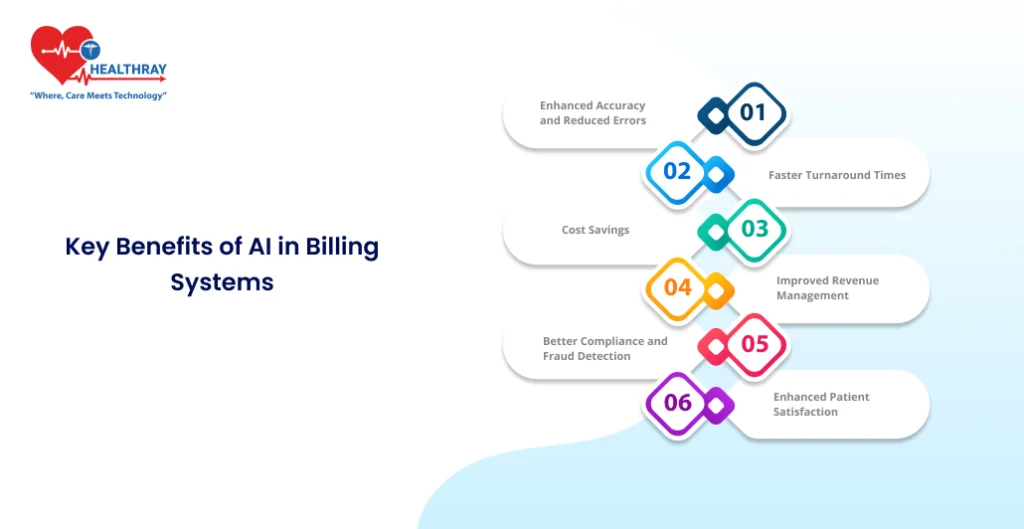
Integrating AI into hospital billing processes offers a range of benefits that go beyond mere automation. These advantages address long-standing challenges and open new opportunities for efficiency and accuracy.
Enhanced Accuracy and Reduced Errors
AI-driven systems excel in identifying and applying the correct billing codes, minimizing human errors that lead to claim denials. Automated coding tools analyze clinical data with precision, ensuring compliance with complex billing rules and improving first-pass approval rates for claims.
Faster Turnaround Times
Billing cycles often involve repetitive tasks like data entry, claim submission, and payment posting. AI tools streamline these processes, significantly reducing the time it takes to move from service delivery to payment. This not only speeds up revenue collection but also improves cash flow for hospitals.
Cost Savings
Manual billing processes require extensive resources, from hiring specialized staff to correcting errors. By automating routine and complex tasks, AI reduces the need for human intervention, lowering operational costs. Fewer denied claims and faster billing also contribute to financial savings.
Improved Revenue Management
AI systems equipped with predictive analytics provide insights into revenue cycles, helping hospitals anticipate cash flow and manage budgets. These tools forecast revenue based on trends, allowing administrators to make informed financial decisions and allocate resources effectively.
Better Compliance and Fraud Detection
Healthcare regulations are constantly evolving, making compliance a moving target for billing teams. AI ensures billing practices align with current regulations, reducing the risk of non-compliance penalties. Advanced AI systems also identify fraudulent activities by spotting irregular patterns in billing data.
Enhanced Patient Satisfaction
By streamlining the billing process, hospitals can deliver clearer, more accurate bills to patients faster. Automated systems also allow staff to focus more on patient care rather than administrative work, improving overall patient experience.
The benefits of AI in billing extend to all stakeholders, from administrators to patients. In the next section, we’ll look at how hospitals can implement AI systems to maximize these advantages.
Implementation Strategies for AI in Hospital Billing
Adopting AI in hospital billing systems requires careful planning to ensure a smooth transition and long-term success. Here’s how hospitals can implement AI effectively:
Assess Organizational Needs
Before investing in AI tools, hospitals must evaluate their billing challenges and goals. Identifying specific pain points, such as high denial rates or slow processing times, helps in selecting the right AI solution tailored to their needs.
Choose the Right Tools and Vendors
Not all AI tools are created equal. Hospitals should prioritize vendors with proven experience in healthcare billing. Key considerations include ease of integration, scalability, and compliance with healthcare regulations like HIPAA.
Integration with Existing Systems
AI tools must integrate seamlessly with existing billing systems and electronic medical records (EMRs). This ensures a unified workflow and prevents disruptions. Hospitals may need to collaborate with IT teams and vendors to customize AI solutions for compatibility.
Train Billing Teams
AI adoption requires upskilling staff to operate new tools effectively. Training programs should focus on helping employees understand AI workflows, troubleshoot basic issues, and interpret AI-generated insights. Staff should feel confident working alongside AI, not threatened by it.
Pilot Testing
Implementing AI on a small scale allows hospitals to identify potential challenges without affecting the entire billing operation. A pilot test helps fine-tune the system, measure its impact, and build a case for full-scale adoption.
Monitor Performance and Adjust
Post-implementation, hospitals must regularly evaluate AI performance using metrics like claim acceptance rates, error reduction, and cost savings. Feedback from billing staff and other stakeholders should inform ongoing improvements to the system.
Implementing AI is not just a technological shift; it’s an organizational change. With a thoughtful approach, hospitals can unlock the full potential of AI while minimizing disruption. In the next section, we’ll discuss the challenges hospitals might face during this process and how to overcome them.
Challenges and Considerations
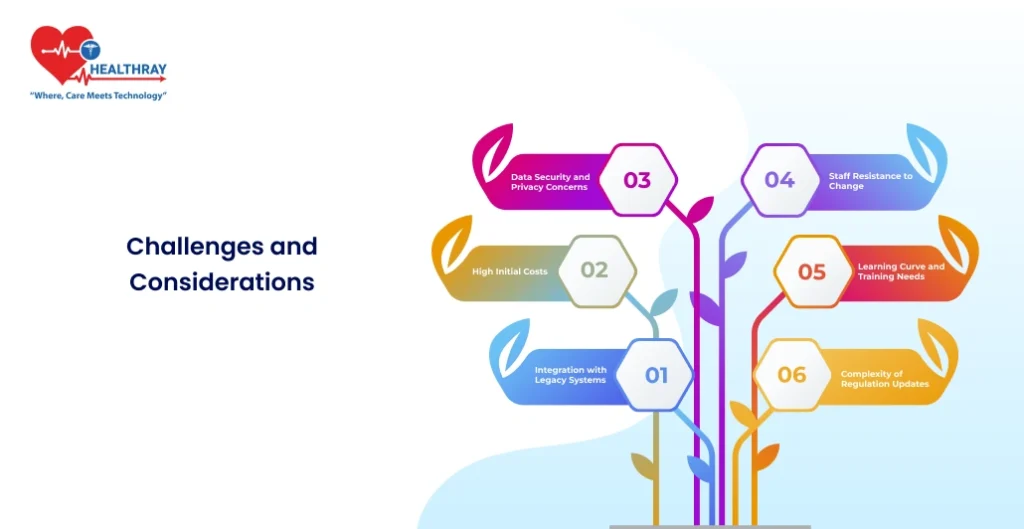
While AI offers significant benefits, implementing it in hospital billing systems isn’t without hurdles. Being aware of these challenges can help hospitals address them proactively and make the transition smoother.
Integration with Legacy Systems
Many hospitals rely on outdated billing and record-keeping systems. Integrating AI tools with these legacy systems can be complicated and time-consuming. Compatibility issues may require additional resources to customize solutions or upgrade existing infrastructure.
High Initial Costs
AI technologies often come with substantial upfront costs, including software licenses, implementation fees, and staff training. Smaller hospitals with tight budgets might find it challenging to justify the investment, even though long-term savings are significant.
Data Security and Privacy Concerns
Billing data contains sensitive patient information that must comply with regulations like HIPAA. Ensuring that AI systems handle data securely and maintain patient confidentiality is critical. Any perceived or actual breach can lead to financial and reputational damage.
Staff Resistance to Change
Introducing AI can cause anxiety among staff, particularly if they fear job displacement. Without clear communication about the role of AI as a support tool, employees may resist adoption, slowing down the implementation process.
Learning Curve and Training Needs
AI systems require billing teams to adapt to new workflows and technologies. Training programs must address skill gaps, but this can take time and temporarily reduce productivity. Hospitals need to invest in ongoing education to keep teams proficient.
Complexity of Regulation Updates
AI must align with constantly evolving healthcare regulations. Keeping the system updated with the latest compliance rules requires continuous monitoring and, in some cases, vendor support. Failing to do so can lead to penalties.
While these challenges may seem daunting, they are not insurmountable. Hospitals that approach AI adoption with a clear strategy and a focus on collaboration can overcome these obstacles. In the next section, we’ll highlight real-world examples of successful AI implementation in hospital billing systems.
Case Studies: Successful AI Implementation in Hospital Billing Systems
Real-world examples demonstrate the tangible benefits of adopting AI in hospital billing. These cases highlight how hospitals have overcome challenges and reaped rewards by integrating AI into their operations.
Large Urban Hospital Reduces Claim Denial Rates
A 500-bed urban hospital implemented an AI-driven predictive analytics tool to address its high claim denial rate. By analyzing historical claim data, the tool identified common reasons for denials, such as missing documentation and incorrect codes. The hospital’s billing team used these insights to correct issues before claims were submitted.
Results:
- 25% reduction in claim denials within six months.
- $1.2 million in recovered revenue from resolved claims.
- Staff time spent on denial management decreased by 40%.
Community Hospital Automates Billing Tasks
A smaller community hospital adopted robotic process automation (RPA) to handle repetitive billing tasks like data entry and payment posting. The AI bots extracted data from electronic medical records (EMRs) and automatically populated billing forms.
Results:
- Billing cycle time reduced by 30%.
- Manual errors dropped by 50%.
- Billing staff redirected to higher-value tasks, such as patient engagement and complex claim resolution.
Multi-Site Health System Improves Revenue Forecasting
A multi-site health system faced challenges with inconsistent revenue projections across its facilities. By implementing an AI-powered revenue cycle management tool, the system analyzed historical data and current trends to provide accurate financial forecasts.
Results:
- 20% improvement in revenue forecasting accuracy.
- Better allocation of resources across facilities.
- Increased financial stability and strategic planning capabilities.
Specialty Clinic Enhances Compliance Monitoring
A specialty clinic dealing with complex billing regulations introduced AI to automate compliance checks. The system flagged discrepancies in claims and ensured that billing codes adhered to the latest guidelines.
Results:
- Compliance-related errors decreased by 60%.
- No penalties for regulatory violations in the first year of implementation.
- Staff confidence in billing accuracy improved significantly.
These examples underscore the transformative impact of AI on hospital billing processes. Hospitals of all sizes and specialties can benefit from AI tools tailored to their specific needs.
In the next section, we’ll look at emerging trends that could further shape the future of AI in hospital billing.
Future Trends in AI for Hospital Billing
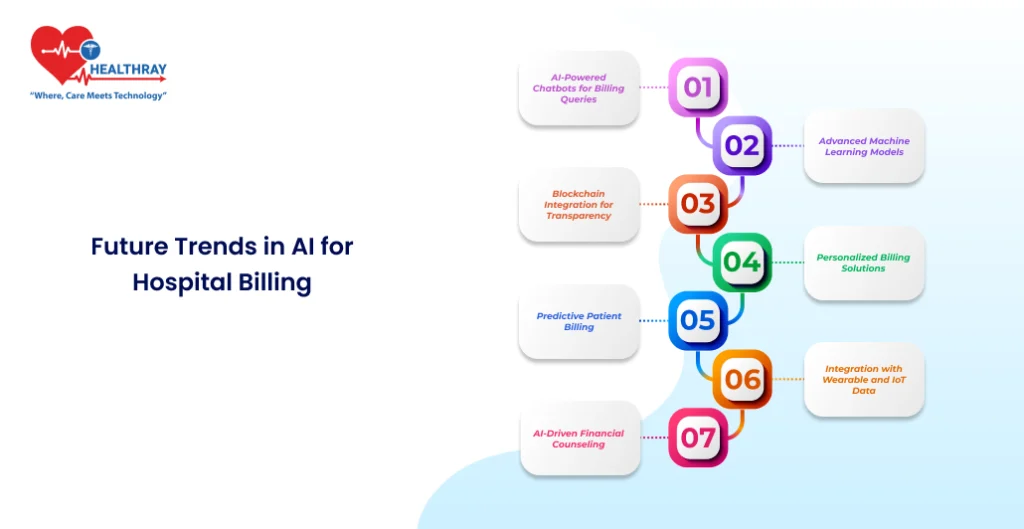
As AI continues to evolve, its applications in hospital billing systems are expected to expand. Here are some emerging trends that are likely to shape the future of billing processes:
AI-Powered Chatbots for Billing Queries
Hospitals are starting to use AI chatbots to handle patient billing questions. These chatbots provide instant responses to common queries, such as payment methods, invoice breakdowns, or insurance coverage details. This reduces the workload on billing staff and improves patient satisfaction.
Advanced Machine Learning Models
Machine learning algorithms are becoming more sophisticated in predicting claim outcomes and identifying anomalies. These advanced models will enable hospitals to optimize revenue cycles further, improving cash flow and minimizing financial risks.
Blockchain Integration for Transparency
Combining AI with blockchain technology offers the potential for more secure and transparent billing. Blockchain can ensure data integrity, while AI automates processes. Together, they can build trust among stakeholders by providing a verifiable record of billing transactions.
Personalized Billing Solutions
AI is being used to customize billing for patients. For example, algorithms can tailor payment plans based on a patient’s financial history and ability to pay. This human-centric approach improves payment collection rates and enhances the patient experience.
Predictive Patient Billing
AI tools are starting to predict the cost of patient care before treatment begins. By analyzing insurance coverage and treatment plans, AI provides patients with accurate cost estimates, reducing confusion and disputes after care is provided.
Integration with Wearable and IoT Data
As wearables and IoT devices generate more patient data, AI will integrate this information into billing systems. This will help hospitals accurately bill for remote monitoring services and ensure compliance with new reimbursement models.
AI-Driven Financial Counseling
AI tools are also helping patients navigate complex billing processes by offering financial counseling. These systems analyze a patient’s financial situation and recommend the best ways to manage medical expenses, improving trust in the healthcare system.
The future of AI in hospital billing is filled with possibilities that promise even greater efficiency, accuracy, and patient satisfaction. Staying ahead of these trends will be crucial for hospitals looking to remain competitive and deliver high-quality care.
Conclusion
AI is revolutionizing the Hospital Management System by addressing long-standing challenges and paving the way for more efficient, accurate, and transparent processes. Hospitals that adopt AI can reduce errors, speed up billing cycles, improve compliance, and achieve significant cost savings.
From automated coding and predictive analytics to real-time reporting and fraud detection, AI provides tools that transform billing from a tedious, error-prone task into a streamlined operation. These advancements free up staff for higher-value activities and allow administrators to focus on strategic decision-making.
While the journey to AI implementation may come with challenges—such as integration with legacy systems, upfront costs, and staff training—the long-term benefits outweigh these hurdles. By carefully planning, training teams, and selecting the right tools, hospitals can position themselves to harness the full potential of AI.
